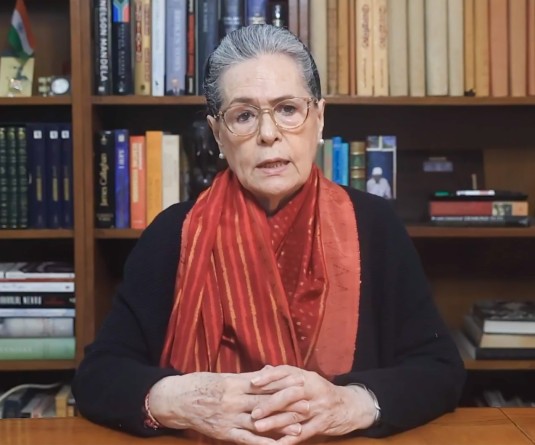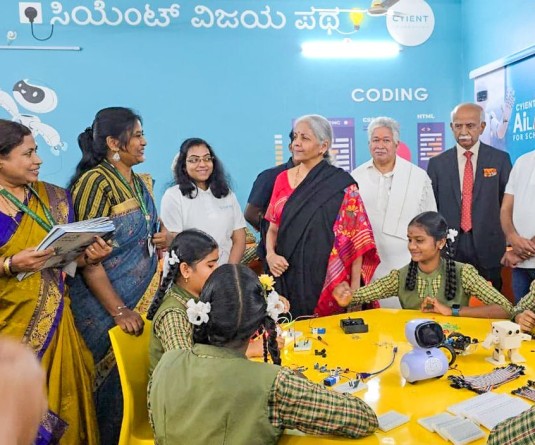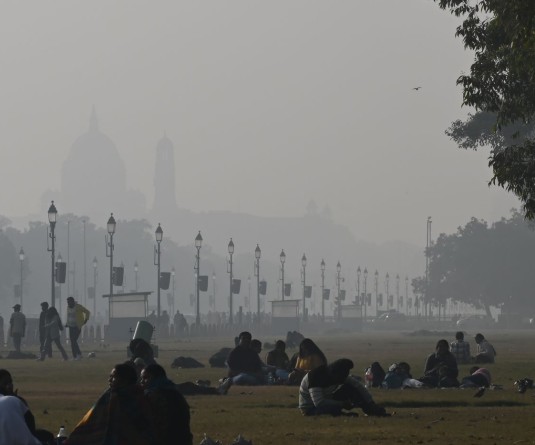IANS Photo

New Delhi, November 1 (IANS): After 10 days, Justice Sanjiv Khanna of the Supreme Court will be sworn in as the 51st Chief Justice of India (CJI).
Justice Khanna will have a tenure of around 6 months as the country's top judge.
CJI D.Y. Chandrachud, who is due to retire on November 10, recommended Justice Khanna as his successor last month. Thereafter, the Centre has appointed Justice Khanna as the CJI with effect from November 11.
Before his elevation to the Supreme Court, Justice Khanna served as a judge in the Delhi High Court till January 2019.
Born in May 1960, he obtained his law degree from the Campus Law Centre, Delhi University. He enrolled as an advocate in the Bar Council of Delhi in 1983 and primarily practised taxation, arbitration, commercial law, environmental law, medical negligence law, and company law in the Delhi High Court.
In the Supreme Court, Justice Khanna has been part of the landmark judgments on Article 370, decriminalisation of adultery, electoral bonds scheme, EVM-VVPAT tally etc. Here are the key judgments authored by him as an apex court judge.
EVM-VVPAT tally verdict
A bench headed by Justice Khanna had said that while it acknowledged the fundamental right of voters to ensure their vote is accurately recorded and counted, the same cannot be equated with the right to 100 per cent counting of VVPAT slips, or a right to physical access to the VVPAT slips, which the voter should be permitted to put in the drop box.
The Bench, also comprising Justice Dipankar Datta, had said that giving physical access to VVPAT slips to voters is "problematic and impractical", and will lead to misuse, malpractices, and disputes.
The Supreme Court had rejected the submission to return to the ballot paper system as "foible and unsound", adding that the weakness of the ballot paper system was well-known and documented.
Interim bail to Arvind Kejriwal in ED case
In a judgment passed on July 12, a bench headed by Justice Khanna opined that former Delhi CM Arvind Kejriwal may be released on interim bail, given the fact that the right to life and liberty is sacrosanct, and he has suffered incarceration of over 90 days.
The 2-judge Bench, also comprising Justice Datta, referred to a larger bench Kejriwal’s plea challenging his arrest and subsequent remand by the Enforcement Directorate (ED) in the alleged liquor policy scam for an authoritative pronouncement on the questions of law involved.
Asked Kejriwal to mull stepping down as CM
In the same July 12 judgment, the Justice Khanna-headed Bench had asked Kejriwal to take a call on stepping down from the CM post.
"We are conscious that Arvind Kejriwal is an elected leader and the Chief Minister of Delhi, a post holding importance and influence. We have also referred to the allegations. While we do not give any direction, since we are doubtful whether the court can direct an elected leader to step down or not function as the Chief Minister or as a Minister, we leave it to Arvind Kejriwal to take a call," it said.
Referring Kejriwal’s plea against his arrest and subsequent remand in the money laundering case to a larger Bench, the 2-judge Bench, also comprising Justice Datta, said: "Larger Bench, if deemed appropriate, can frame question(s) and decide the conditions that can be imposed by the court in such cases."
Interim bail to Kejriwal during Lok Sabha elections
In view of the 2024 general polls, a bench headed by Justice Khanna had ordered then CM Kejriwal to be released on 21-day interim bail in the money laundering case and had asked him to surrender on June 2.
Imposing a slew of conditions, Justice Khanna-led Bench asked Kejriwal to not visit his office or secretariat, while out on interim bail. It clarified that the grant of interim relief should not be treated as an expression of opinion on the merits of the case or the appeal pending before the apex court.
As per the SC order, Kejriwal was prevented from signing official files unless it was required and necessary for obtaining clearance/ approval from the Lt Governor.
The Bench, also comprising Justice Datta, said that it had passed a “very clear” order fixing the timeline of Kejriwal’s “release and surrender" and was not making any exception to anybody.
Electoral bonds scheme
In a unanimous verdict, CJI Chandrachud-headed Constitution Bench struck down the electoral bonds scheme saying that denying voters the right to know the details of funding of political parties would lead to a dichotomous situation and the funding of political parties cannot be treated differently from that of the candidates who contest elections.
In his separate concurring opinion, Justice Khanna said that based on the analysis of the data, he arrived at the conclusion that the electoral bonds scheme failed to meet the balancing prong of the proportionality test.
"However, I would like to reiterate that I have not applied proportionality stricto sensu due to the limited availability of data and evidence," he said.
His opinion contained the data as available on the website of the Election Commission (EC) and the data submitted by the petitioners. However, Justice Khanna clarified that the court had not opened the sealed envelope given by the EC.
Further, he observed that the majority of contributions through bonds have gone to political parties which are ruling parties in the Centre and the states.
Manish Sisodia bail
In October last year, a bench headed by Justice Khanna had denied bail to the former Delhi Deputy CM Manish Sisodia in the excise policy case but said that if the trial proceeds slowly in the next three months, he may apply for bail afresh.
Subsequently, in August this year, a bench headed by Justice B.R. Gavai granted bail to Sisodia taking note of the fact that he suffered incarceration of more than 17 months and the trial in the case has not yet commenced.
Sanjay Singh bail
In April this year, a bench headed by Justice Khanna granted bail to AAP Rajya Sabha member Sanjay Singh in connection with the money laundering case linked to the alleged excise policy scam.
Noting that the ED had no objection to Singh being released on bail, the bench clarified that it has not made any comments on merits.
Article 370
A 5-judge Constitution Bench, also comprising Justice Khanna, had upheld the revocation of Article 370. In a concurring opinion, Justice Khanna said: "Article 370 was enacted as a transitional provision and did not have a permanent character. The abrogation of Article 370 does not negate the federal structure, as the citizens living in Jammu and Kashmir do and will enjoy the same status and rights as given to citizens residing in other parts of the country."
The Constitution Bench, headed by CJI Chandrachud, had ordered the Election Commission to take steps to conduct elections to the Jammu and Kashmir Assembly by September 30, 2024, and said that "restoration of statehood shall take place at the earliest and as soon as possible".
It had left open the question of whether the Parliament can extinguish the character of statehood by converting a state into one or more Union Territories, relying on the statement made by Solicitor General Tushar Mehta that statehood would be restored to Jammu and Kashmir.
In May this year, the apex court refused to review the Constitution Bench verdict and dismissed a batch of review pleas filed against its decision.






